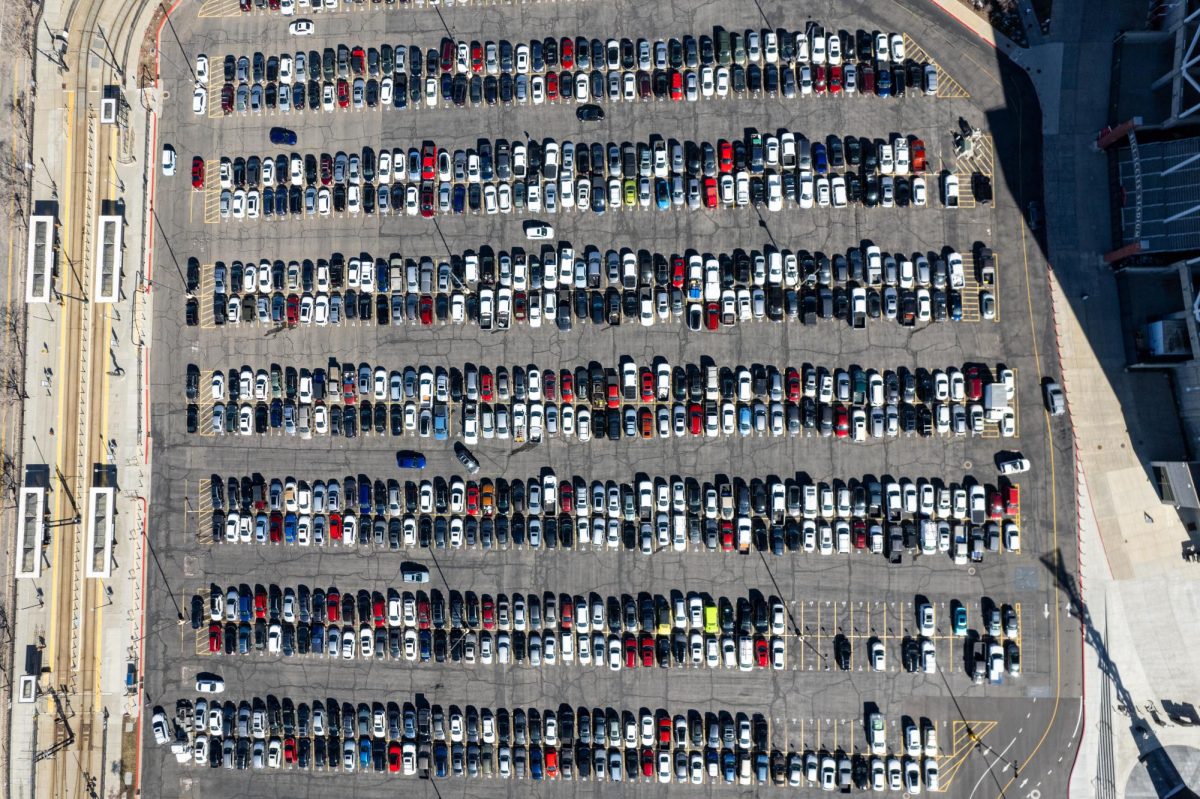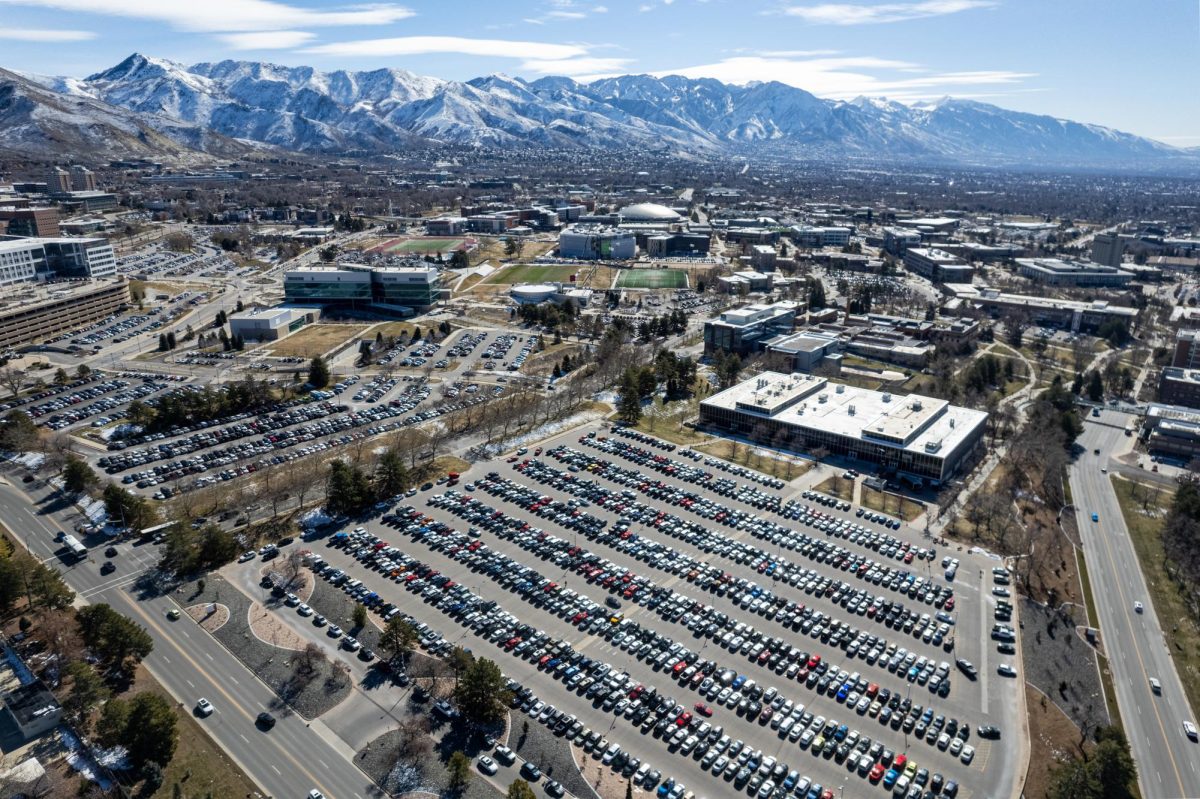This story is part one of a two-part series about the University of Utah’s plan to alleviate parking challenges. You can read part two here.
Every University of Utah student — former or current — understands that parking is a struggle on campus. After paying tuition and fees, students often find themselves frustrated with a perceived lack of parking availability, even after purchasing a nearly $200 parking permit.
“I would say my overall experience with parking is a hit or miss,” said Fernanda Guzman, a U senior studying health, society and policy. “I sometimes drive around for 30 to 45 minutes trying to find U parking spots.”
Collin Simmons, director of Auxiliary Services at the U, which Commuter Services falls under, acknowledged that there are parking challenges on campus — and there have been for the last 20 years.
“The message that has gone … to President [Taylor] Randall is the state of the parking is tight, but it’s not full,” Simmons said.
In the fall 2023 semester, Commuter Services conducted a three-week-long empty stall count to discover how many open parking spots there are across different lots on campus at all times of the day.
They found that parking availability is limited in the interior lots at peak times (10 a.m. to 1 p.m. Monday through Thursday), but parking is often still available on the outskirts of campus.
Simmons encouraged students to try parking farther away from their classes in the exterior lots on campus since their data shows they’re more likely to find open spots there.
“Oftentimes, students get locked into [parking at] one location … and they would rather drive around for 10 or 15 minutes hoping for a stall [rather] than parking farther away and walking more,” he said.
Still, Simmons said he realizes the parking problem on campus requires a “multiple-prong approach” over many years to alleviate the challenges.
Raising Parking Permit Prices
Simmons said one of those prongs is increasing parking permit prices to “drive behavior change,” with the hope that fewer people will buy permits if the price is higher, lessening the demand for parking spaces.
There are no limits on how many permits are sold. 22,462 U permits were sold in the 2022-23 fiscal year, according to Auxiliary Services.
Last year, a standard U parking permit saw its biggest increase ever at 15%, according to Simmons. That brought the cost up to $172.50 per semester.
That is higher than all other Utah colleges’ parking permit prices by nearly $100, but Simmons said that’s still “well below market rates for urban university campuses.”
After last year’s increase, Simmons expected fewer permits to be sold and for more people to use alternative modes of transportation.
“That did not happen — this last year, we’ve sold more permits than we’ve ever sold,” Simmons said. “… We were wrong.”
The U’s Board of Trustees has already approved parking permit increases for the next four fiscal years. In the 2024-25 fiscal year, permits will increase by 12.5% and then they will increase by 10% for the following three years, Simmons said.
“I believe that the increasing prices will alter behavior — when that tipping point of behavior change happens is yet to be determined,” Simmons said.

Auxiliary Services Funding
Simmons added increases to parking permit prices are also necessary because they, along with hourly parking and tickets, fund operational costs like maintaining parking and paying back debt on parking garages.
Auxiliary Services receives a yearly amount funded by a “transportation fee” charged to students, staff and faculty. This pays for a contract with UTA in its entirety, according to Jennifer Reed, vice president of Auxiliary Services.
The contract amount for the current fiscal year is $4,424,000, said Reed.
It allows for any fee-paying students, faculty or staff member at the U to ride UTA transit for free with their UCard. The contract also pays for transit use for large university events like football games and funds the U’s campus transit system, including the campus shuttles and SafeRide programs.
‘Inequitable and unjust’
Alex Duncan, a writing & rhetoric studies major at the U, said he doesn’t think that increasing parking permit prices will cause fewer students to buy them.
“People that need to drive up to school will drive to school,” Duncan said. “A change in price won’t change much as college students already are in debt with school and wouldn’t mind extra debt for parking.”
Communications major Lauren Atley said she has no other choice than to purchase a permit because she lives beyond Utah Transit Authority’s jurisdiction, and living on campus is “financially out of reach” for her.
“I’m left with no choice but to continuously bear the burden of escalating parking costs, despite reaping minimal benefits,” Atley said. “I already have hefty tuition fees I’m obligated to pay; this additional expense makes my financial strain so much worse.”
Guzman said she doesn’t think the plan to continue to increase parking permit costs is a fair way to treat students.
“To make something quite literally unattainable for most students in order to decrease demand is inequitable and unjust,” she said. “Clearly, if the monetary increase recently did not help alleviate the demand for permits, then students are really in need of these parking spots.”
Guzman, and several other students interviewed by the Chronicle, said they think more U permit parking should be built on campus.
Although the long-term plan to fund the rapid growth of the student body is building parking garages, Simmons said it’s not that simple.
“We have to be fairly strategic on how we fund those garages because those garages will not be funded with state dollars. … Parking permit revenue will have to fund those garages,” Simmons said, adding they cost significantly more than surface lots.
Simmons added he anticipates that they’ll pick where the next parking garage is sometime in the next 12 months, but there’s still a lot to sort out as far as funding, design and planning.





Robert Lee Nievar • Mar 21, 2024 at 6:31 pm
scrap more parking and add housing closer to the university buildings and in addition to that have trax actually go into the university. Public transit can move more people per square foot than car transit will.
Anne • Mar 6, 2024 at 1:00 pm
In case you didn’t know, Auxiliary means they are financially independent from the university. They have to bring in their own money to meet operational costs. State restrictions are pretty tight regarding use of university dollars. Tuition dollars don’t ever go toward parking structures. You can’t simultaneously demand lower parking costs and more parking spaces, that’s not how things work. There’s no free lunch. Commuter services has to somehow fund the lease of land the university for parking purposes, plus costs of maintenance and construction for either surface parking or parking structures. (BTW, parking structures cost about 7x more per parking spot than surface lots.) The university can make better use of land than more parking.
I agree that UTA should be more robust, but compensating for the lack of transit infrastructure with even more vehicle infrastructure is not the solution. That cements vehicular transit as the norm. Housing affordability on and around campus is another huge issue we should be focusing on, not lack of parking. Google induced demand, more parking probably wouldn’t even help all that much.
Sam • Mar 8, 2024 at 9:24 am
Vehicular transit IS the norm at the U. The lack of affordable housing on and around campus has solidified that. The university is not making use of the land, they are building massive dorms on highly frequented parking lots. How would the university ever dream of better parking if they are building a 778-person dorm and NO PARKING AT ALL? We have all given up on affordable housing at the U because we can’t even get a place to park near our classes. The university is trying to expand but it can’t even facilitate the students it has now.
Colleen • Mar 5, 2024 at 7:26 pm
The problem could be solved by investing in a better infrastructure. Make public transportation more attractive and accessible. Bus and Trax take too long, are crowded or don’t have convenient routes with multiple transfers. Solve this problem, and the parking issues would resolve itself.
Alan • Mar 5, 2024 at 2:21 pm
You’ve quite literally proven raising prices of parking tickets doesn’t work. Clearly the university is not at all concerned with their students from the parking directors statements. If my inflated tuition for a mediocre experience coupled with a 500 dollar parking pass can’t pay for one single parking garage I don’t know what will.
Eli • Mar 5, 2024 at 2:07 pm
The u has been having parking issues since my father was attending the university that’s just incompetence.
Ian • Mar 5, 2024 at 2:04 pm
Simmons’s is a joke. Money is not a problem for you guys. With the amount of tickets you give out you’re making profit. Also if you want people to use public transportation make it easier. For me to use trax id have to head to school 2 hours before I usually go to school. Trax barely has any stops and it’s not fast. It would drop me off just to have a 30 min walk to class